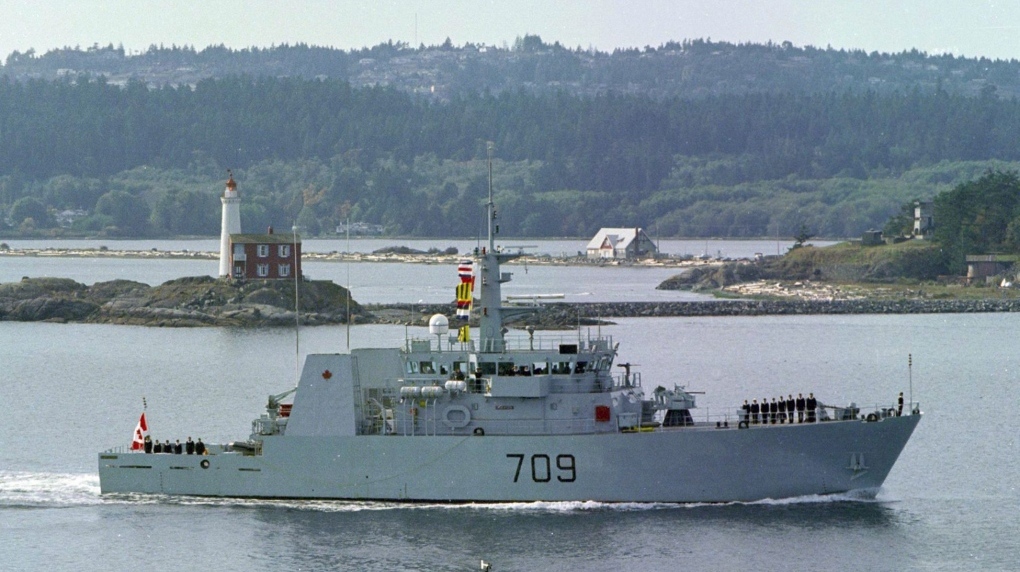Canadian warships return to Esquimalt, B.C., after three-month operation
 HMCS Saskatoon arrives in Esquimalt Harbour, B.C., sailing past Fisgard Lighthouse, in this undated DND handout photo. (THE CANADIAN PRESS / DND)
HMCS Saskatoon arrives in Esquimalt Harbour, B.C., sailing past Fisgard Lighthouse, in this undated DND handout photo. (THE CANADIAN PRESS / DND)
Two Canadian navy ships returned to their homeport in Esquimalt, B.C., on Thursday following their participation in Operation Caribbe, a counter-narcotics mission led by the U.S.
During their three-month deployment at sea, the HMCS Saskatoon and HMCS Yellowknife were called to 21 cases of potential illicit drug activity, and seized and destroyed roughly 872 kilograms of cocaine, according to the Department of National Defence.
The two warships sailed about 33,874 nautical miles and visited four countries during their patrols in the eastern Pacific Ocean.
One notable incident occurred just two weeks after the ships were deployed, when crewmembers helped intercept and destroyed about 800 kilograms of cocaine.
"I’m proud of the work carried out by the sailors who took part in Operation Caribbe on HMC Ships Saskatoon and Yellowknife these past three months," said Lt.-Commander Nadia Shields, task force commander, in a statement.
"Their contribution to this U.S.-led counter-narcotics operation in the East Pacific Ocean has ensured that approximately 872 kilograms of cocaine will not make it to our streets and harm Canadians," she said.
Operation Caribbe launched in November 2006. Since then, Canadian navy and air force members have helped disrupt or seize the shipment of more than 120 tonnes of cocaine, according to the Department of National Defence.
CTVNews.ca Top Stories

Outdated cancer screening guidelines jeopardizing early detection, doctors say
A group of doctors say Canadian cancer screening guidelines set by a national task force are out-of-date and putting people at risk because their cancers aren't detected early enough.
Mussolini's wartime bunker opens to the public in Rome
After its last closure in 2021, it has now reopened for guided tours of the air raid shelter and the bunker. The complex now includes a multimedia exhibition about Rome during World War II, air raid systems for civilians, and the series of 51 Allied bombings that pummeled the city between July 1943 and May 1944.
'I just started crying': Blue Jays player signs jersey for man in hospital
An Ontario woman says she never expected to be gifted a Blue Jays jersey for her ailing husband when she sat alone at the team’s home opener next to a couple of kind strangers.
LIVE @ 4 EDT Freeland to present 2024 federal budget, promising billions in new spending
Canadians will learn Tuesday the entirety of the federal Liberal government's new spending plans, and how they intend to pay for them, when Deputy Prime Minister and Finance Minister Chrystia Freeland tables the 2024 federal budget.
B.C. woman facing steep medical bills, uncertain future after Thailand crash
The family of a Victoria, B.C., woman who was seriously injured in an accident in Thailand is pleading for help as medical bills pile up.
Step inside 'The Brain': Northern education tool aims to promote drug safety
An immersive experience inside a massive dome coined 'The Brain' is helping youth learn about brain function and addiction
WATCH Half of Canadians living paycheque-to-paycheque: Equifax
As Canadians deal with a crushing housing shortage, high rental prices and inflationary price pressures, now Equifax Canada is warning that Canadian consumers are increasingly under stress"from the surging cost of living.
Ontario woman charged almost $7,000 for 20-minute taxi ride abroad
An Ontario woman was shocked to find she’d been charged nearly $7,000 after unknowingly using an unauthorized taxi company while on vacation in January.
Inmate who escaped from N.B. prison has long history of violent crimes
An inmate who escaped from Dorchester Penitentiary in Dorchester, N.B., on Saturday evening has a long history of violent crimes and a history of escaping custody.
































